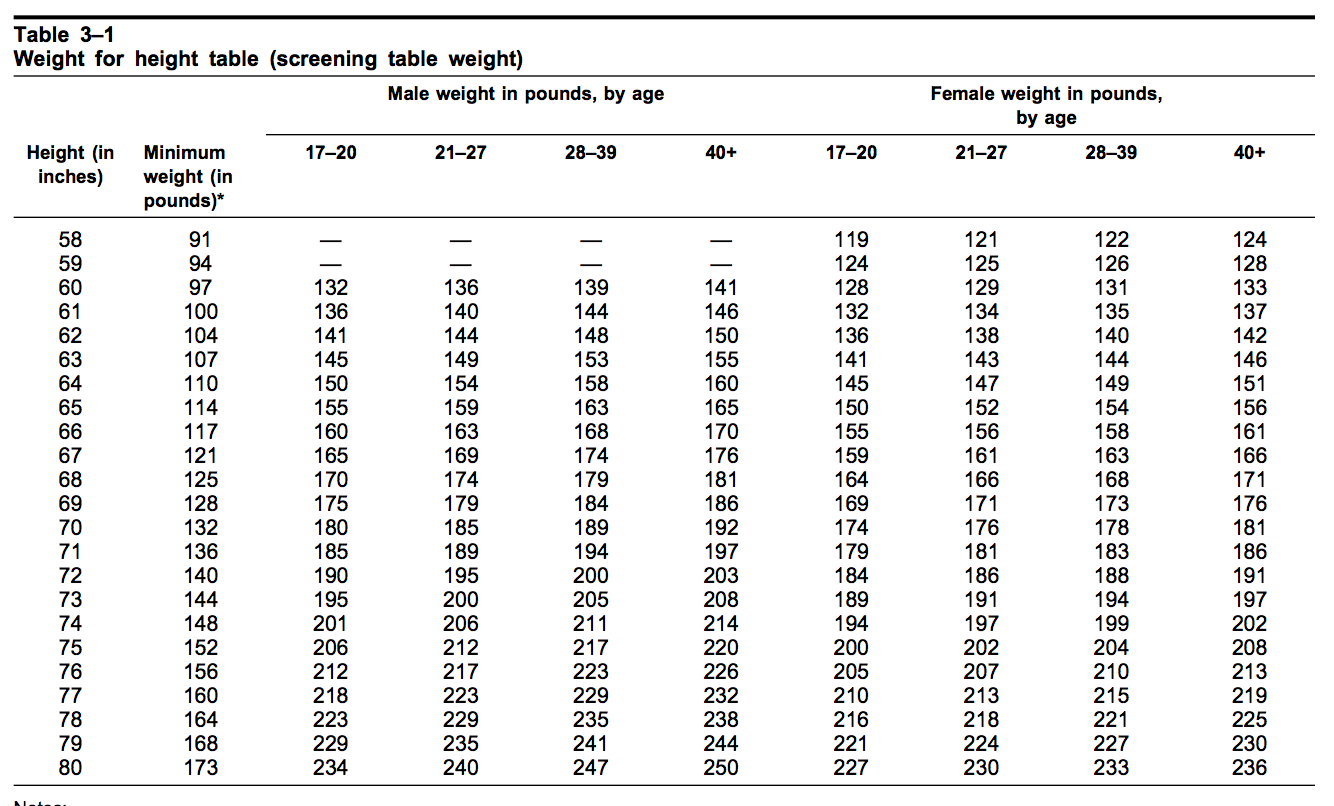The army weight requirement is a crucial aspect of military enlistment that candidates must navigate before joining the ranks. Ensuring that recruits meet specific weight standards is essential for maintaining a physically capable and operationally ready force. The United States Army, like many military branches, has established guidelines that dictate the acceptable weight range based on height and age, reflecting the importance of physical fitness in military service.
For potential recruits, understanding the army weight requirement is not only about meeting the metrics but also about embracing a lifestyle that promotes health and fitness. As candidates prepare for the Armed Services Vocational Aptitude Battery (ASVAB) test and subsequent training, they must focus on their physical readiness, which includes adhering to weight standards. This requirement ensures that all service members can perform their duties effectively and efficiently, contributing to the overall mission of the Army.
In addition to weight, the Army has other physical fitness standards that must be met, such as body fat percentage and physical training test scores. Together, these components create a comprehensive framework that helps maintain the Army's operational readiness and effectiveness. This article will delve into the specifics of the army weight requirement, exploring its implications, eligibility criteria, and the importance of physical fitness in military life.
What are the Army Weight Requirements?
The army weight requirement is determined by a combination of height and age. Each recruit must fall within a specific weight range that aligns with their height to qualify for enlistment. The weight standards are established to ensure that all personnel can meet the physical demands of military service. Here are some key points regarding the army weight requirement:
- Weight categories are based on a height-weight chart.
- Age is also a factor, as different age groups may have slightly different weight allowances.
- Body fat percentage is assessed to ensure that recruits do not only meet weight but also maintain a healthy physique.
How is the Army Weight Requirement Measured?
The measurement of the army weight requirement typically involves a straightforward process that includes weighing the recruit and measuring their height. The following steps outline how this assessment is conducted:
- The recruit is weighed on a standard scale to determine their body weight.
- The recruit's height is measured using a stadiometer or measuring tape.
- The recruit's body fat percentage may also be assessed using calipers or other methods.
What Happens if a Recruit Does Not Meet the Army Weight Requirement?
If a recruit does not meet the army weight requirement, they may be given an opportunity to lose weight before enlistment. The Army provides resources and guidance to help candidates achieve their fitness goals. However, it is important to note that failure to meet the weight standards could result in disqualification from service. Candidates should be proactive in understanding their weight status and taking necessary steps to comply with the requirements.
Why is the Army Weight Requirement Important?
The army weight requirement is vital for several reasons, including:
- Ensuring all recruits can perform physically demanding tasks.
- Maintaining overall troop readiness and effectiveness.
- Promoting a culture of fitness and health within the military.
What Resources are Available to Help Meet the Army Weight Requirement?
Potential recruits have access to numerous resources aimed at helping them meet the army weight requirement. These resources include:
- Fitness programs and training regimens tailored for military preparation.
- Nutrition guidance to promote healthy eating habits.
- Support from recruiters and fitness professionals who can provide advice and motivation.
How Does the Army Weight Requirement Affect Career Progression?
Meeting the army weight requirement is not only essential for enlistment but also plays a significant role in a service member's career progression. Failure to maintain the required weight and fitness standards can lead to:
- Ineligibility for promotions and special assignments.
- Increased scrutiny during physical fitness evaluations.
- Potential separation from service if standards are persistently unmet.
Can Weight Waivers be Granted for the Army Weight Requirement?
In some instances, weight waivers may be granted for candidates who are close to meeting the army weight requirement but do not fully qualify. These waivers are typically evaluated on a case-by-case basis and may consider:
- The recruit's overall physical fitness.
- Previous military service or experience.
- Potential contributions to specific military roles.
What is the Impact of Body Composition on the Army Weight Requirement?
Body composition plays a significant role in the army weight requirement. The Army emphasizes not just weight but also the importance of healthy body fat percentages. Recruits must understand:
- Body fat assessments are conducted to ensure recruits are not only within weight limits but also maintain a healthy physique.
- Excess body fat can impair performance and increase the risk of injury.
- Maintaining a balanced diet and exercise regimen is essential for meeting both weight and body composition standards.
Final Thoughts on the Army Weight Requirement
In conclusion, the army weight requirement is a critical factor that potential recruits must consider when preparing for military service. Adhering to these standards not only ensures eligibility for enlistment but also promotes a healthy lifestyle vital for a successful military career. Aspiring soldiers should take proactive measures to understand the requirements and utilize available resources to achieve their fitness goals. With commitment and determination, meeting the army weight requirement can be an attainable objective for anyone looking to serve their country.




